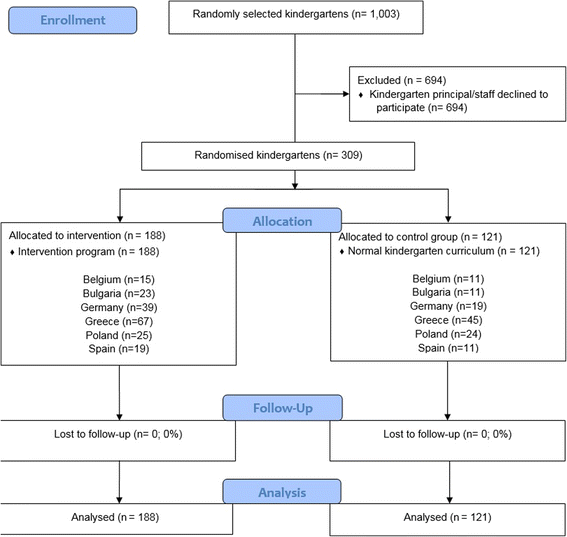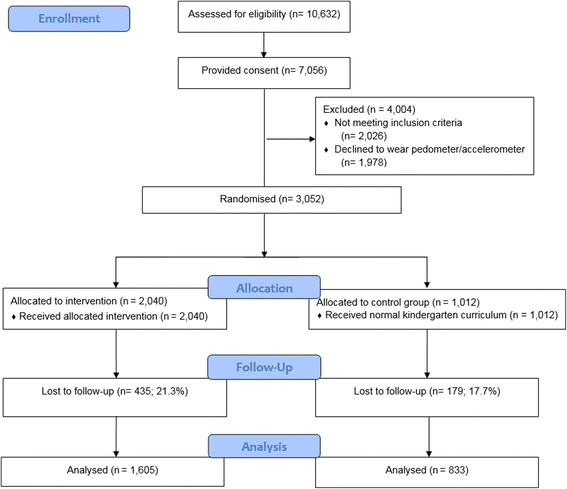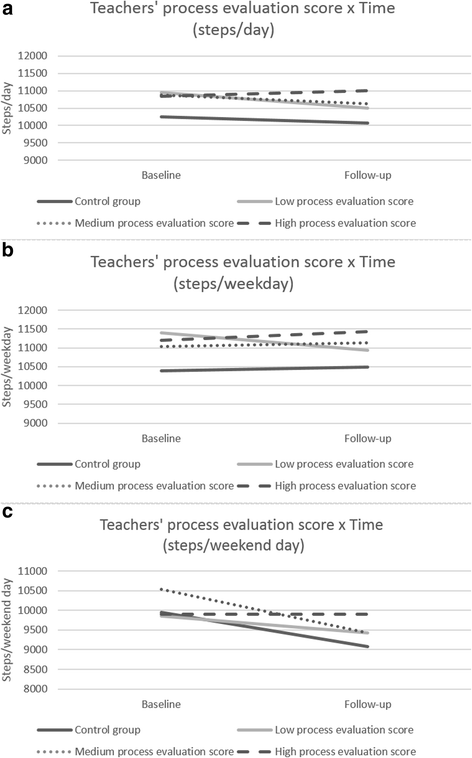Effect and process evaluation of a kindergarten-based, family-involved cluster randomised controlled trial in six European countries on four- to six-year-old children's steps per day: the ToyBox-study
- PMID: 28851434
- PMCID: PMC5576230
- DOI: 10.1186/s12966-017-0574-z
Effect and process evaluation of a kindergarten-based, family-involved cluster randomised controlled trial in six European countries on four- to six-year-old children's steps per day: the ToyBox-study
Abstract
Background: The ToyBox-intervention is a theory- and evidence-based intervention delivered in kindergartens to improve four- to six-year-old children's energy balance-related behaviours and prevent obesity. The current study aimed to (1) examine the effect of the ToyBox-intervention on increasing European four- to six-year-old children' steps per day, and (2) examine if a higher process evaluation score from teachers and parents was related to a more favourable effect on steps per day.
Methods: A sample of 2438 four- to six-year-old children (51.9% boys, mean age 4.75 ± 0.43 years) from 6 European countries (Belgium, Bulgaria, Germany, Greece, Poland and Spain) wore a motion sensor (pedometer or accelerometer) for a minimum of two weekdays and one weekend day both at baseline and follow-up to objectively measure their steps per day. Kindergarten teachers implemented the physical activity component of the ToyBox-intervention for 6 weeks in total, with a focus on (1) environmental changes in the classroom, (2) the child performing the actual behaviour and (3) classroom activities. Children's parents received newsletters, tip cards and posters. To assess intervention effects, multilevel repeated measures analyses were conducted for the total sample and the six intervention countries separately. In addition, process evaluation questionnaires were used to calculate a total process evaluation score (with implementation and satisfaction as a part of the overall score) for teachers and parents which was then linked with the physical activity outcomes.
Results: No significant intervention effects on four- to six-year-old children' steps per weekday, steps per weekend day and steps per average day were found, both in the total sample and in the country-specific samples (all p > 0.05). In general, the intervention effects on steps per day were least favourable in four- to six-year-old children with a low teachers process evaluation score and most favourable in four- to six-year-old children with a high teachers process evaluation score. No differences in intervention effects were found for a low, medium or high parents' process evaluation score.
Conclusion: The physical activity component of the ToyBox-intervention had no overall effect on four- to six-year-old children' steps per day. However, the process evaluation scores showed that kindergarten teachers that implemented the physical activity component of the ToyBox-intervention as planned and were satisfied with the physical activity component led to favourable effects on children's steps per day. Strategies to motivate, actively involve and engage the kindergarten teachers and parents/caregivers are needed to induce larger effects.
Keywords: Effect evaluation; Europe; Pedometer; Preschool; Process evaluation; RCT; Step counts; ToyBox.
Conflict of interest statement
Ethics approval and consent to participate
The ToyBox-study was approved by the Ethical Committees in all European countries, in line with national regulations (i.e. in Belgium by the Medical Ethics Committee of the Ghent University Hospital; in Bulgaria by the Ethics Committee of the Medical University of Varna; in Germany by the Ethics Committee of the Ludwig Maximilian University of Munich; in Greece by the Bioethics Committee of Harokopio University and the Greek Ministry of Education; in Poland by the Bioethics Committee of the Children’s Memorial Health Institute and the Department of Information and Publicity of the Polish Ministry of Education; and in Spain by the Clinical Research Ethics Committee and the Department of Consumers’ Health of the Government of Aragón.
Written informed consent was obtained from four- to six-year-old children’ parents.
Consent for publication
Not applicable.
Competing interests
The authors declare that they have no competing interests.
Publisher’s Note
Springer Nature remains neutral with regard to jurisdictional claims in published maps and institutional affiliations.
Figures
Similar articles
-
Effect and process evaluation of a kindergarten-based, family-involved intervention with a randomized cluster design on sedentary behaviour in 4- to 6- year old European preschool children: The ToyBox-study.PLoS One. 2017 Apr 5;12(4):e0172730. doi: 10.1371/journal.pone.0172730. eCollection 2017. PLoS One. 2017. PMID: 28380053 Free PMC article.
-
Effect and Process Evaluation of a Cluster Randomized Control Trial on Water Intake and Beverage Consumption in Preschoolers from Six European Countries: The ToyBox-Study.PLoS One. 2016 Apr 11;11(4):e0152928. doi: 10.1371/journal.pone.0152928. eCollection 2016. PLoS One. 2016. PMID: 27064274 Free PMC article. Clinical Trial.
-
Developing the intervention material to increase physical activity levels of European preschool children: the ToyBox-study.Obes Rev. 2014 Aug;15 Suppl 3:27-39. doi: 10.1111/obr.12176. Obes Rev. 2014. PMID: 25047376
-
Caregiver involvement in interventions for improving children's dietary intake and physical activity behaviors.Cochrane Database Syst Rev. 2020 Jan 5;1(1):CD012547. doi: 10.1002/14651858.CD012547.pub2. Cochrane Database Syst Rev. 2020. PMID: 31902132 Free PMC article.
-
Folic acid supplementation and malaria susceptibility and severity among people taking antifolate antimalarial drugs in endemic areas.Cochrane Database Syst Rev. 2022 Feb 1;2(2022):CD014217. doi: 10.1002/14651858.CD014217. Cochrane Database Syst Rev. 2022. PMID: 36321557 Free PMC article.
Cited by
-
Effects of the Preschool-Based Family-Involving DAGIS Intervention on Family Environment: A Cluster Randomised Trial.Nutrients. 2020 Nov 4;12(11):3387. doi: 10.3390/nu12113387. Nutrients. 2020. PMID: 33158101 Free PMC article. Clinical Trial.
-
Longitudinal changes in preschoolers' adiposity indicators according to compliance with 24-hour movement behavior guidelines: results from the ToyBox-study.BMC Public Health. 2024 Nov 11;24(1):3115. doi: 10.1186/s12889-024-20626-2. BMC Public Health. 2024. PMID: 39528995 Free PMC article.
-
Which behaviour change techniques are associated with interventions that increase physical activity in pre-school children? A systematic review.BMC Public Health. 2023 Oct 16;23(1):2013. doi: 10.1186/s12889-023-16885-0. BMC Public Health. 2023. PMID: 37845721 Free PMC article.
-
Implementing a nutrition education intervention in Eastern Norwegian Kindergartens: barriers and facilitators.BMC Nutr. 2024 Jul 24;10(1):103. doi: 10.1186/s40795-024-00908-z. BMC Nutr. 2024. PMID: 39049131 Free PMC article.
-
Associations between Daily Step Counts and Physical Fitness in Preschool Children.J Clin Med. 2020 Jan 7;9(1):163. doi: 10.3390/jcm9010163. J Clin Med. 2020. PMID: 31936133 Free PMC article.
References
Publication types
MeSH terms
Grants and funding
LinkOut - more resources
Full Text Sources
Other Literature Sources
Medical




